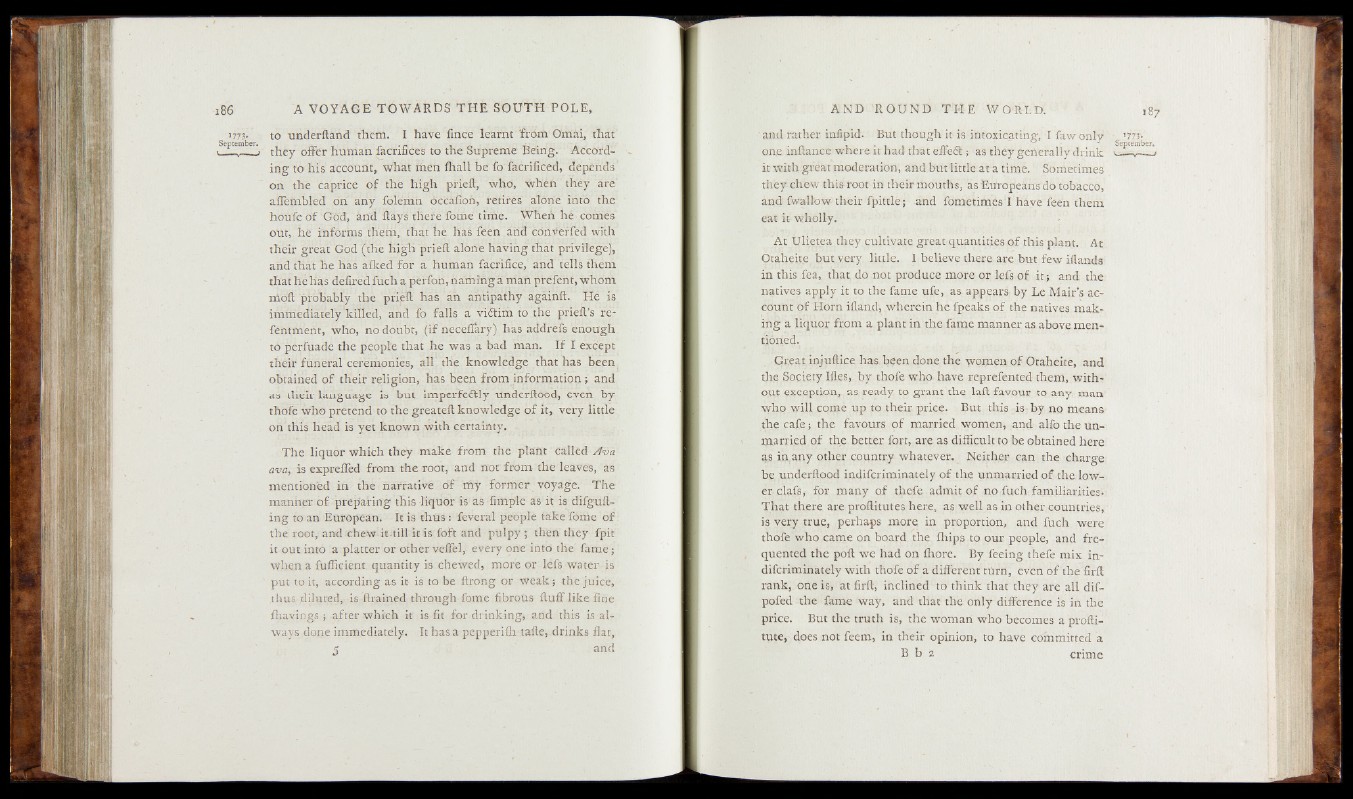
1773* to underftand them. I have fince learnt 'from Omai, that
SepiemheN tjley 0£fcr human facrifices to the Supreme Being. According
to his account, what men Ihall be fo facrificed, depends
on the caprice of the high priefl, who, when they are'
affembled on any folerhn occafion, retires alone into the
hou'fe of God, arid flays there fome time. When he conies
out, he informs therri, that he has feen arid converfed with
their great God (the high priefl alone having that privilege),
and that he has afked for a human facrifice, and tells them
that he has defired fuch a perfon, naming a man prefent, whom
irioft probably the priefl has an antipathy againft. He is
immediately killed, andTo falls a vidtim to the prieft’s re-
fentirierit, who, no doubt, (if necefiary) has addrefs enough
to perfuade the people that he was a bad man. If I except
their funeral ceremonies, all the knowledge that has been
obtained of their religion, has been from information ; and
as their language is but imperfectly underftood, even by
thofe who pretend to the greateft knowledge of it, very little
on this head is yet known with certainty.
The liquor which they make from the plant called AWa
ava, is exprefled from the root, and not from the leaves, as
mentioned in the narrative of my former voyage. The
manner of preparing this liquor is as Ample as it is difguft-
ing to an European. It is thus : feveral people take fome of
the root, and chew it-till it is foft and pulpy ; then they fpit
it out into a platter or other veffel, every one into the fame;
when a fufficient quantity is Chewed, more or lefs water is
put to it, according as it is to be ftrong or weak; the juice,
thus diluted, is ftrained through fome fibrous fluff like fine
fhavings ; after which it is fit for drinking, and this is always
done immediately. It has a pepperifli tafte, drinks flat,
5 and
and rather infipid. But though it is intoxicating, I faw only
one inftance where it had that effeCt ; as they generally drink
it with great moderation, and but little at a time. Sometimes
they che w this root in theirmouths, as Europeans do tobacco,
and fwallow their fpittle; and fometimes I hâve feen them
eat it wholly. ; -
At Ulietea they cultivate great quantities of this plant. At
Otaheite but. very little. I believe there are but few iflands
in this fea, that do not produce more or lefs of it; and the
natives apply it to the fame ufe, as appears- by Le Mair’s account
of Horn ifland, wherein he fpeaks of the natives making
a liquor from a plant in the fame manner as above mentioned.
Great injuftice has been done the women of Otaheite, and
the Society Ifles, by thofe who have reprefented them, without
exception, as ready to grant the laft favour to any man
who will come up to their price. But this is-by no means
the cafe; the favours of married women, and alfo the unmarried
of the better fort, are as difficult to be obtained here
as in, any other country whatever. Neither can the charge
be underftood indifcriminately of the unmarried of the lower
clafs, for many of thefe admit of no fuch familiarities.
That there are proftitutes here, as well as in other countries,
is very true, perhaps more in proportion, and fuch were
thofe who came on board the fhips to our people, and frequented
the poft we had on fhore. By feeing thefe mix indifcriminately
with thofe of a different turn, even of the firft
rank, one is, at firft, inclined to think that they are all dif-
pofed the fame way, and that the only difference is in the
price. But the truth is, the woman who becomes a profti-
tute, does not feem, in their opinion, to have committed a
B b 2 crime